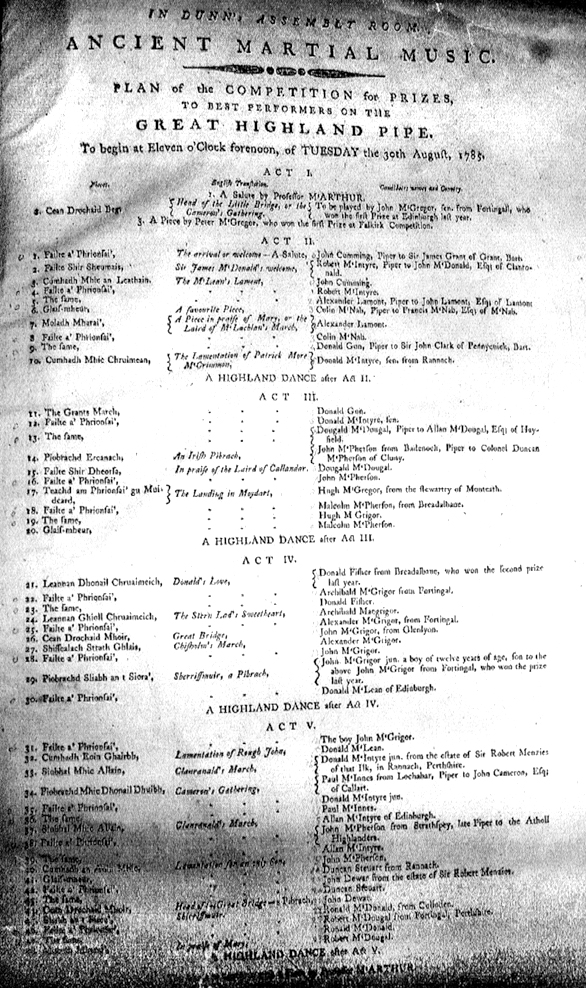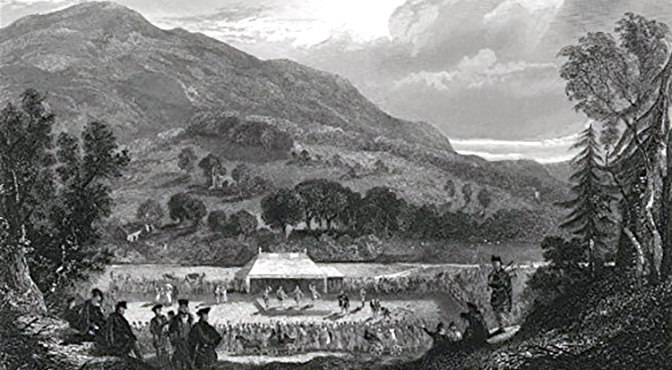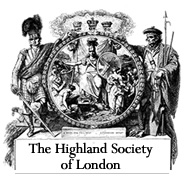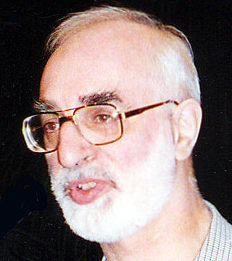By Keith Sanger
Piping historian Keith Sanger is renowned for the meticulous research into all aspects of the instrument and its music – and the people who played it. We are grateful to Keith for supplying this background to the MacIntrye family of pipers, noted performers and reputedly composers of tunes such as the Prince’s Salute, My King Has Landed in Moidart and the Battle of Sherrifmuir.
Donald Roy MacIntyre
Appears in the Breadalbane records as a piper in 1674, his birth therefore is placed at least ten years earlier. Likewise his wife Margaret Dunster’s birth is going to have been earlier than her minimum legal age for their marriage in 1678. All references to Donald Roy with a location always place him in the vicinity of Kenmore, that is just generally under ‘Kenmore’ in the earlier rentals, at Balloch in his marriage entry and more specifically at Wester Stucks (modern Stix) in the later entries. Was the incumbent piper when ‘the piper was sent to Edinburgh for pipes’ in 1679
When Donald Roy first appears he is described as a piper, but is also being given £40 to learn his trade plus £4 to buy him clothes. Unfortunately it does not record where he was going to learn that trade, but since a similar sum of £40 was given to Donald’s son John when he was sent to ‘McCrooman’ it would seem to be a reasonable assumption that Donald may also have preceded his son to Skye.
Donald Roy and his wife were clearly still alive and healthy in 1722 when they petitioned the new Earl for a recommencement of the weekly meal allowance that had ceased at death of the previous Earl. In their petition they describe themselves as ‘now turned very old and infirm’ but an alternative view was given in another petition that same year from the four other tenants of Wester Stucks, who complained that the piper not only abused their arable lands with his beastes ‘but when we challenge him therefore threatens and abuses us, and besides a great many loose persons frequenting his house brings us his neighbours under every bad character’ and whose horses were also in what would have been an unenclosed holding, abusing the arable land.
Clearly, Donald Roy’s home was functioning as a sort of ceilidh house with people being drawn there for the music from his pipes. The other tenants had clearly had enough and even offered ‘if it please your honour to remove the said Donald from our neighbourhood they would pay the rent of his croft if it could not be re-let’.
Died before 1728 when a Testament was recorded.
John MacIntyre
First appears in the Breadalbane records being sent as a ‘prentice’ in 1697, his birth is therefore place at least ten years earlier. The Kenmore Parish records unfortunately have a gap between the end of March 1678 until re-commencing in 1687 so his birth would probably fall somewhere within this period. His time in Skye was over by March 1700 when Breadalbane requested his Ground Officer in Glenorchy to find a set of pipes for him and that he was allowed twenty-four pounds as his fee. Presumably no set was free so he then turns up between 1701 to 1703, along with two of his Skye buddies John and Donald MacCrummen, listed under ‘Drummers’ in Captain Campbell of Fonads Company of soldiers.
By 1705 he was acting as piper to Breadalbane’s son Colin Campbell on his estate in Nether Lorn and was holding one merkland rent free in the twenty merkland of Degnish, about five miles south of Ardmaddy. Colin Campbell died young in 1707, John MacIntyre presumably stayed on in Degnish for a while, since he was still in Lorne when in 1709 the factor there responding to a request from the Earl arranged for him to go to Castle Kilchurn on Loch Awe. His father’s home at Wester Stucks by Kenmore was at that time right at the edge of the Breadalbane lands, north across the river Tay was the Menzies estate, and Easter Stucks was also held by Menzies at that time.

MacIntyres can be found on both estates so when John got a tack on the Menzies lands in Rannoch in 1711 the MacIntyres already in the area were probably related to him. Rannoch was not the most settled part of the country as far as the rule of law went (probably why it was easier to get a holding there), and by 1712 John McIntyre piper in Rannoch was already pursuing an unsuccessful Sheriff Court claim for three stolen cows. Whether it was the need to recoup his losses or simply using his piping skills to earn extra income, he is next recorded as receiving remuneration in 1713 for his piping services at the deer hunt in Atholl and at the Fortingal market. In the record of payment he was described as piper to Finab, (Campbell of Finab/Fonab) but this seems to have only been a short-term or temporary position, possible connected with the military post which had been placed at Rannoch to police the area, an aim which given his loss of cows, he would have probably supported.
By the following year he was certainly back as ‘John McIntyre pyper in Kinchlacher’ when he was paid by the Menzies estate for attending Dull market. From then on he is firmly associated with Kinchlacher where he is shown in the rentals but without the attribution of ‘piper’ although when he appears elsewhere in for example the accounts for buying in meal he is always described as piper in Kinchlacher or piper in Rannoch. The implication is that from the start he held the tack on the same basis as any of the other tacksmen and not for his services as a piper, which when used by, for example, Finab or for attending markets and other occasions he was paid specifically for those events. However, as time went on while he is still not described as a piper in the rentals, he starts to get a ‘salary’ which offsets about half of the rent of his tack and it has to be assumed that this was certainly connected with his skill as a piper.
The reason appears to be that there was already a piper, one Donald MacGregor, formerly employed as such on the Menzies estate, initially in Camserny and then after 1722, when Menzies of Weem acquired part of the forfeited Kynachan estate, MacGregor was given half of Bruce Croft rent free. It is very significant that when Donald MacGregor disappears from the rentals circa 1734, probably having died, John MacIntyre at Kinchlacher starts being described as piper in the rentals.
Duncan MacIntyre
Other than the entry in the Kenmore Parish record for the 13th September 1691, recorded as Baptised to Donald McIntyre & Margt Dunster his wife a child called Duncan, nothing more is heard of him.
Donald MacIntyre
Donald MacIntyre senior was described as a man of 75 years of age when he competed and gained first prize in the 1785 competition in Edinburgh . Uniquely, this was his second prize pipe since he had also previously been awarded the prize pipe in 1783, but as this followed that year’s official Highland Society of London Competition, which had earlier been held in Falkirk, it presumably did not count as a Highland Society of London prize.
Allan MacIntyre
Competed in the second competition of 1783, where he was described as late of the 71st regiment, and resident in Edinburgh. This was probably his second spell as a resident there since a letter written to Sir Robert Menzies by his son in Edinburgh in 1771 has what appears to be a reference to him ‘and have at last got Allan McIntyre made a Town Guard Soldier’. He competed again in 1785 when he was described as Allan McIntyre of Edinburgh, and again in 1786 when he was described as ‘of Rannoch’. I have still to collate the rentals where he for a time was a tenant.

John MacIntyre
Appears along with his father and two brothers in a list of all adult males on the Rannoch tacks, which differed from the normal rentals by listing all the cotters (sub tenants) and servants. The document was undated but suggested to be later than 1743, although probably not by much and may have had some sort of connection with the events leading to the ’45, but what is not clear since most of the Menzies tenants took their lead from Menzies of Weem himself who endeavoured to stay aloof from both sides of the conflict. However, since John MacIntyre senior died around the beginning of 1743, it must be before then.
Donald MacIntyre
Competed in 1785 when he was described as Donald M’Intyre jun. from the estate of Sir Robert Menzies of that Ilk in Rannoch. He competed again in 1786 when he was described as Donald M’Intyre from Sir Rob. Menzies estate. As the father of Robert MacIntyre (No 9 in the family tree) he is probably the ‘Donald Ban’ of the Gaelic poem composed in praise of his son. In 1797 was a witness to the marches of the Menzies Rannoch Estate and was described as being 70 years old. 
Dugald MacIntyre
Gained second prize in 1794 and first in 1799, on both occasions being described just as Dugald MacIntyre from Lorne, Argyllshire. In the account of the 1783 competition, Donald MacIntyre was described as ‘piper to Sir Robert Menzies. This man has bred two sons, pipers, and he himself is son to the late celebrated M’Intyre who was bred at the College of Dunvegan’. Taken as read it clearly refers to Donald senior son of the John MacIntyre who was sent to Skye in 1697 and means that he had another piping son apart from Donald junior. Lacking any other suitable candidate and given the MacIntyre families previous associations with the Campbells, then Dugald seems to be the likely missing member of the family. It also adds an interesting point that if correct it means that after Donald Senior had won the double prize pipes in 1783 and 1785, a member of each of the next two generations, Dugald in 1799 and Robert in 1790 were also winners of prize pipes.
Robert MacIntyre
Was baptised in Fortingal Parish on the 2 April 1769, parents Donald McIntyre and Christine McGregor in Kinchlacher. Gained third prize at the 1787 competition when he was described as piper to John MacDonald of Clanranald. Gained second prize in 1788 and first prize in 1790. Sometime after Clanranald died in 1794 he seems to have been taken on by MacNeil of Barra as he was described as ‘servant to Mr MacNeil of Barra’ when he petitioned the Tutors of the Clanranald estate in 1799/1800 for a farm in Arisaig or alternatively Benbecula. Emigrated to Nova Scotia circa 1810-1813. leaving the ‘MacIntyre Pipes’ behind with MacDonald of Kinlochmoidart. They are now deposited in the West Highland Museum, Fort William.
John MacIntyre
According to the short account on the Menzies pipes in the Proceedings of the Society of Antiquaries of Scotland volume 29, (1894/95), ‘John MacIntyre the brother of Robert, lived in the Menzies Rannoch country where he died about 1834-5, leaving a son, Donald, who had a farm called Allarich, at the top of Loch Rannoch’. This farm name was presumably a mistake or misprint for ‘Ardlarich’ which is on the north side of the loch just a few miles east from Kinchlacher. The MacIntyre family connection with the farm may go back to Allan MacIntyre whose wife Elizabeth Kennedy was described in their marriage entry as ‘in Ardlarich’.
Donald MacIntyre
Probably the son of John MacIntyre (No 10), competed in the HS competitions of 1816 and 1818.
















Recent Comments